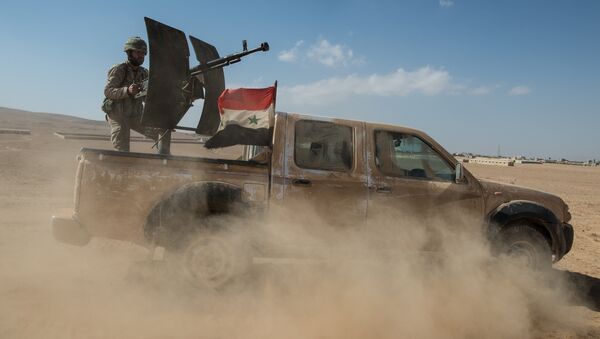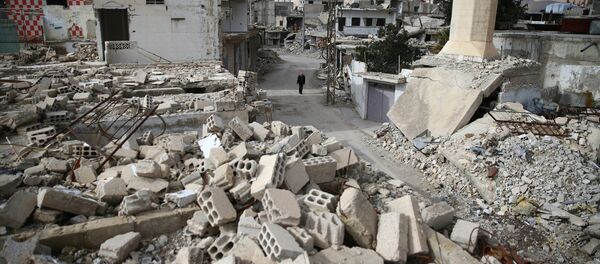During reconciliation talks in Astana on May 4, Russia, Iran and Turkey signed a memorandum on establishing four safe zones, or zones of de-escalation of tension.
Furthermore, from midnight May 1, Russia stopped using its Aerospace Forces in the zones defined by the document.
"From 12 am on May 1, the use of aircraft of the Russian Aerospace Forces in areas corresponding to the de-escalation zones defined by the memorandum was stopped," the Russian General Staff's Main Operational Directorate Col. Gen. Sergei Rudskoi told reporters.
Commenting on the move, Russian Deputy Defense Minister Lt. Gen. Alexander Fomin underscored that the implementation of the memorandum will help resolve the six-year-long conflict in Syria.
"The implementation of the memorandum will allow for stopping the combat activities by warring sides and practically put an end to the civil war in Syria," Fomin said, adding that the memorandum will enter force on May 6.
According to the document obtained by Sputnik on Thursday, Moscow, Tehran, and Ankara will form a working group on drawing up the maps of proposed de-escalation zones in the Idlib province, to the north of the city of Homs, in Eastern Ghouta and in the south of the country within the next two weeks.
In his article for the online newspaper Vzglyad, Russian political analyst Evgeny Krutikov highlighted that the proposed initiative shouldn't be regarded as a "concession to Washington."
Indeed, the US has long been the most vocal proponent of establishing no-fly or "safe" zones in Syria.
"Many have already seen in this idea an agreement between the Russian Federation and the United States on the division of responsibility in Syria, or at least the prototype of such a deal. The thing is that it was Washington who came up with the idea of creating 'safe zones' [in Syria] under President [Barack] Obama. He proposed the introduction of 'no-fly zones' in the same manner the US and NATO implemented them in Iraq by merely 'slicing' the country horizontally. Donald Trump picked up this idea, practically adding nothing new to it, except that he did not exclude Russia from the process," Krutikov recalled.
Krutikov also called attention to the fact that the US does not have any access to most of the territory of the Syrian Arab Republic with the exception of some Kurdish areas. Nor does Washington control the Syrian airspace, the political analyst highlighted.
"In any case, it is premature to talk about some sort of 'collusion' between Moscow and Washington, or about considering any," he said, adding that "even in Astana the American delegation has the status of an observer."
"It is also unclear clear on which groups the Americans now have influence. It is quite possible that it no longer controls any," he remarked.
Meanwhile, the US signaled that it "appreciates" the efforts of Russia and Turkey to reach an agreement for de-escalation zones in Syria.
"We appreciate the efforts of Turkey and the Russian Federation to pursue this agreement and have encouraged the Syrian opposition to participate actively in the discussions despite the difficult conditions on the ground," the statement says.
The political analyst pointed out that Damascus supports the creation of the de-escalation zones in the form promoted by Russia, Iran, and Turkey. For its part, Moscow has reiterated the necessity to preserve the sovereignty and unity of Syria.
"Syria supports the Russian initiative on de-escalation zones… Syria affirms the continuation of the war against terrorism…We wish that our Russian, Iranian friends will discuss the details of implementation of this memorandum as soon as possible," Bashar Jaafari, the Permanent Representative of the Syrian Arab Republic to the United Nations, said.



